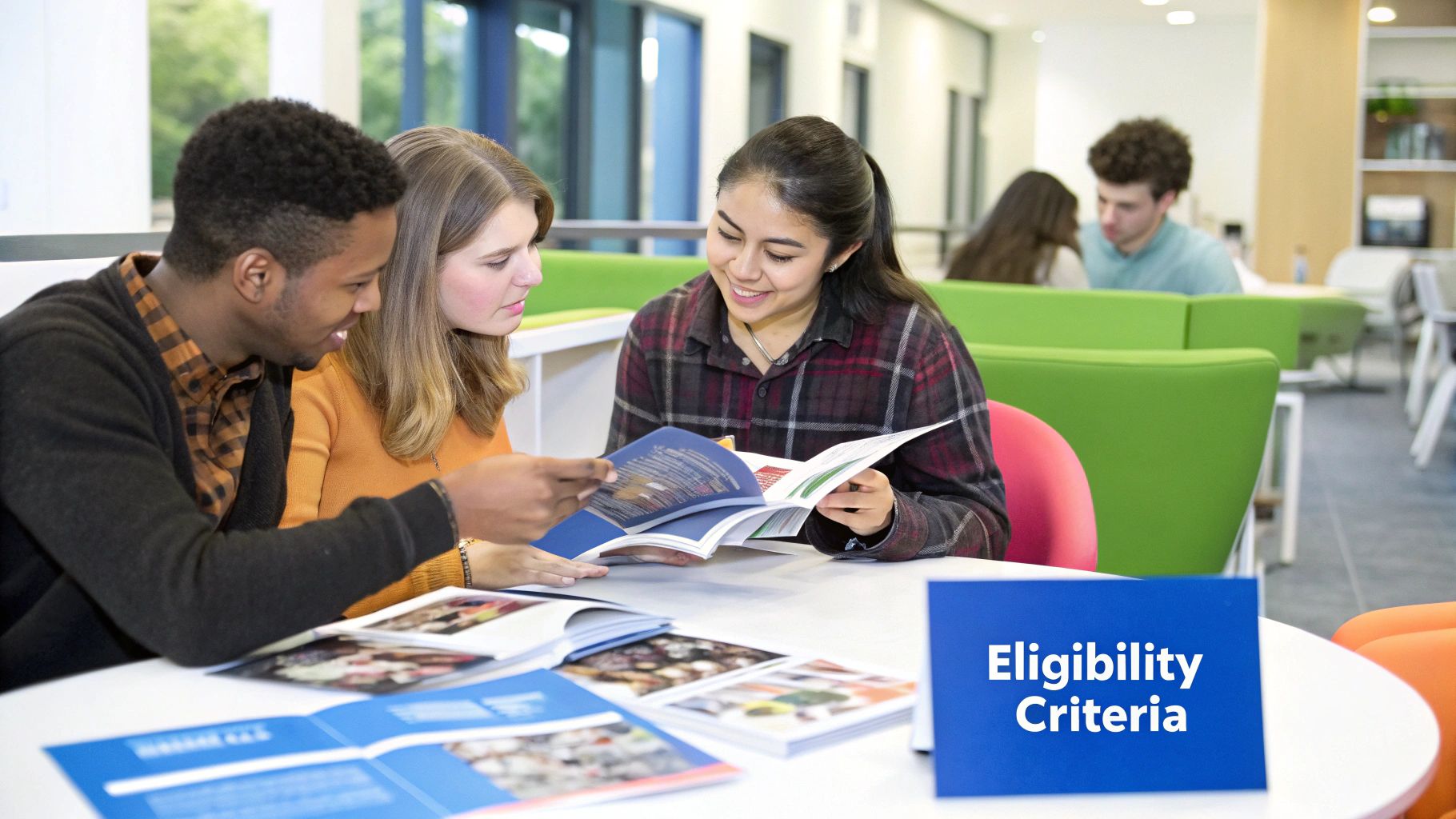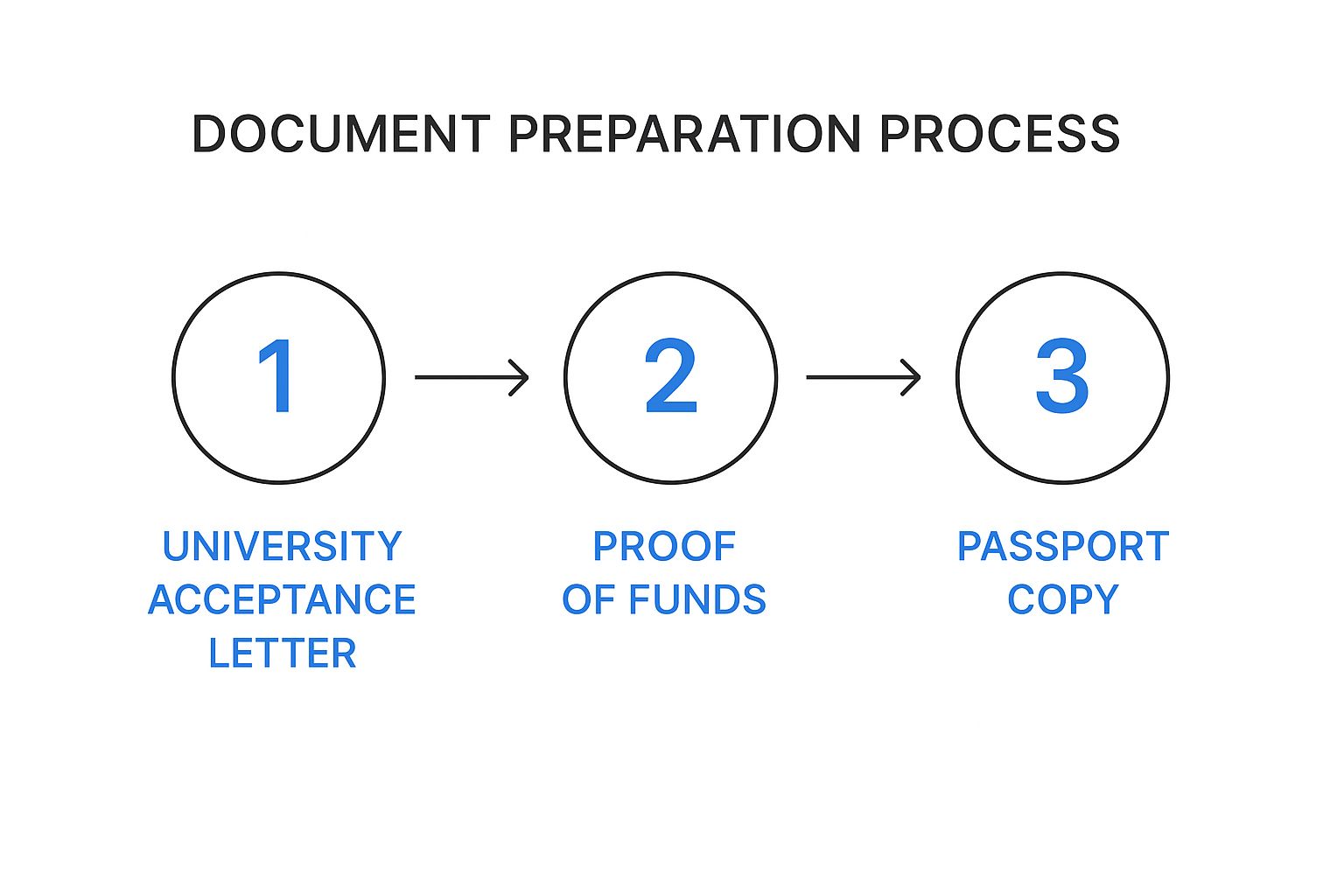UK Study Visa Requirements for Nigerian Students | How to Apply

So, you're dreaming of studying in the UK? That's a fantastic goal, but let's be honest, the visa application can seem like a mountain to climb. The good news is that it's more straightforward than you might think. For Nigerian students, it really comes down to ticking three major boxes: getting a Confirmation of Acceptance for Studies (CAS) from your university, showing you have the money to pay for your course and living costs, and gathering your key personal documents.
Your Path to Studying in the UK

Your journey to a UK university campus doesn't start at the airport; it begins with the visa process. The official channel for international students is called the Student Route. Think of it less as one giant obstacle and more like a series of checkpoints. You just need to pass through each one, proving that you're a genuine student who's ready for the academic and financial demands of UK life.
This guide is designed to be your step-by-step companion, breaking down the entire process into clear, manageable chunks. My goal is to make sure you know exactly what you need to do and why it’s important.
Getting to Grips With the Points-Based System
The UK's entire immigration framework, including the Student Route, is built on a points system. To get your visa, you need to score exactly 70 points. Don't worry, this isn't like a test where you can get a partial score; it’s an all-or-nothing system, and it’s simpler than it sounds.
You earn these points by fulfilling three essential requirements:
- Confirmation of Acceptance for Studies (CAS): This is the big one. Securing a valid CAS from your chosen university (which must be a licensed student sponsor) instantly gives you 50 points.
- Financial Requirement: Proving you have enough money for your tuition and living expenses gets you another 10 points.
- English Language Requirement: Demonstrating you can speak, read, write, and understand English to the required standard adds the final 10 points.
Nail these three, and you're well on your way. For a deeper look into why so many are making this journey, it’s worth reading the insights from Nigerians in the diaspora who chose to study in the UK.
You may have heard about recent changes to UK visa policies, particularly around bringing dependents. While this did cause a dip in applications from Nigeria, numbers are recovering. Early this year, there was a 4.6% increase, with over 411,100 study visas issued. The key takeaway? Even with policy adjustments, the approval rate for strong applications is still incredibly high—between 95% and 97%.
To help you keep track of everything, here is a quick summary of what you'll need.
UK Student Visa Requirements at a Glance
This table breaks down the main things you need to secure for a successful UK study visa application.
| Requirement | What It Means | Why It Is Important |
|---|---|---|
| Confirmation of Acceptance for Studies (CAS) | An official, electronic document from your university confirming your unconditional offer to study. | This is non-negotiable and worth 50 points. It proves you are a genuine student with a place at a recognised institution. |
| Financial Proof | You must show you have enough money to cover your first year's tuition fees and living costs. | This is worth 10 points and shows the UK government that you can support yourself financially without needing public funds. |
| English Language Proficiency | You must prove you can understand and communicate in English to the required level (usually a B2 level). | This requirement is worth 10 points and confirms you can cope with the academic demands of a UK degree taught in English. |
| Valid Passport & Documents | You'll need a current passport and other key documents, like academic transcripts and potentially a TB test certificate. | These are essential for verifying your identity, academic history, and health status as part of the application process. |
Getting these four areas right is the foundation of a solid application. With careful preparation, you can confidently navigate the process and turn your UK study plans into a reality.
Securing Your Unconditional Offer and CAS

Before you even touch the visa application, your first real mission is to get an unconditional offer from a UK university. This is the green light for everything that follows, and it leads directly to the most important document in this whole process: the Confirmation of Acceptance for Studies (CAS).
Think of the CAS as the university’s official stamp of approval, sent directly to the UK Home Office. It’s a special reference number that basically says, “We’ve accepted this student. They’ve met our academic standards and proven they can fund their studies.” Without a CAS, your visa application is a non-starter.
Your journey will almost always begin with a conditional offer. This is the university saying, "We like you, but…" You'll need to meet their conditions, which usually means hitting specific grades in your final exams or proving your English language proficiency. Once you’ve ticked all their boxes, your offer becomes unconditional, and the university can finally issue your CAS.
What Is a CAS and Why Is It So Important?
A CAS isn't just a random number; it's a detailed digital record that the Home Office will scrutinise. It’s a cornerstone of the requirements for study visa in UK and essentially validates your entire application.
This document contains all the crucial details about your place, including:
- Your unique CAS number
- The university's name (your official licensed sponsor)
- Full details of your course, like the title, length, and start date
- The total tuition fees for your first year or the whole course
- Any money you’ve already paid towards tuition or accommodation
It is absolutely critical that every single detail on your CAS is 100% accurate. Even a small error—a typo in your name or the wrong course title—can be grounds for a visa refusal. Don’t take that chance.
Your First Steps After Receiving Your CAS
The moment that CAS lands in your inbox, the clock starts ticking on your visa application. It's time for a pre-flight check. Read through every single detail with a fine-tooth comb.
Start by pulling up your passport and offer letter. Does your name match exactly? Are the course details what you expect? Have they correctly listed any deposit you've already paid? If you spot anything that looks even slightly off, contact your university’s admissions office immediately. Get it fixed before you submit your application.
Remember, a CAS is only valid for six months from its issue date. You also can't apply more than six months before your course starts. This timing is everything. A flawless CAS provides the 50 points you need for your visa, but only if it's correct and submitted within the right window. Taking a few extra minutes to double-check it now can save you a world of trouble later.
Meeting the Financial Requirements

Let's be honest, proving you can pay for your studies is often the most nerve-wracking part of the UK student visa process. The Home Office needs solid proof that you can cover your first year's tuition and living costs without having to work illegally or access public funds. Think of it as a financial safety net that shows them you’re genuinely ready for your new life in the UK.
The total amount you need to show is split into two main chunks: your tuition fees and your maintenance (living costs). The tuition fee part is straightforward—it’s simply the outstanding balance for your first academic year, which will be clearly stated on your CAS.
The maintenance part, however, is a little more specific. The UK Visas and Immigration (UKVI) has set fixed amounts that depend on where your university is located.
Calculating Your Living Costs
To meet the financial requirements, you need to prove you have a certain amount set aside just for living expenses. This figure changes based on your university's location because, as you can imagine, costs vary quite a bit across the country.
Here’s how it breaks down:
- Studying in London: You must show £1,334 per month for up to nine months. That comes to a total of £12,006.
- Studying outside London: The requirement is a bit lower at £1,023 per month for up to nine months, which totals £9,207.
So, the simple formula for your total required fund is: (First-Year Tuition Fees) + (Required Maintenance Fund). If you’ve already paid a deposit for your tuition or university accommodation, that amount gets subtracted from the total you need to show in your bank account.
The Critical 28-Day Rule Explained
This is a major trip-up for many applicants, so pay close attention. It’s not enough to just have the money; you have to prove you’ve held it for a specific period. The total required funds must be in your bank account (or your parent’s) for a minimum of 28 consecutive days.
The closing balance on your bank statement can’t be more than 31 days old on the day you submit your application. The timing here is absolutely crucial.
Think of it this way: the UKVI wants to see that the money is stable and truly yours, not just a lump sum you borrowed for a few days to pass the check. If your balance dips below the required amount for even a single day within that 28-day window, your application will almost certainly be refused. For applicants from Nigeria, this rule is strictly enforced, so careful planning is a must. To get a better handle on managing your savings for this, checking out a foundational guide to financial planning is a really smart move.
Using Parental or Sponsor Funds
Many students from Nigeria rely on their parents or an official sponsor for funding, and that’s completely fine. However, you’ll need to provide extra documents to prove the relationship and their consent.
If you’re using your parent’s bank statements, you must include:
- Your original birth certificate showing your parents' names.
- A signed letter from that parent confirming your relationship and giving you permission to use their funds for your UK studies.
The landscape for student visas is always shifting. In the first quarter of this year, demand for UK study visas from Nigerian applicants jumped by a massive 64% compared to last year, showing a strong desire to study in the UK despite economic hurdles. For a complete overview of all the requirements, it’s a good idea to review our comprehensive guide on the UK student visa application process.
Gathering Your Essential Documents
Let's be honest, the paperwork part of the visa process can feel like a huge mountain to climb. But getting it right is non-negotiable. A well-organised set of documents is your best bet for convincing the Home Office that you’re a genuine student, ready to start your course.
Think of it this way: every document you submit backs up a claim you’ve made in your application. One missing paper or an incorrect format can cause frustrating delays or, in the worst-case scenario, a rejection. So, let’s take this step-by-step and get it right the first time.
Your Core Document Checklist
While your personal circumstances might require a few extra papers, there's a core set of documents that almost every Nigerian student will need to provide. These are the absolute fundamentals of your application.
Here’s what you absolutely must have:
- A current international passport: This isn't just for travel. It needs to have at least one completely blank page (for the visa sticker) and be valid for your entire stay in the UK.
- Academic transcripts and certificates: These are the original documents your university used to offer you a place, as listed on your CAS. They prove you have the qualifications needed for your course.
- Two passport-sized colour photographs: Pay close attention to the rules here. They must meet the UKVI's strict guidelines on size, background colour, and even your facial expression.
Feeling overwhelmed by the list? Using a project priority matrix template can be a surprisingly helpful tool. It allows you to track what you've collected, what's still pending, and what needs your immediate attention.
Proving English Proficiency
One of the key requirements for a study visa in the UK is demonstrating a solid command of English. For most students coming from Nigeria, you have a couple of straightforward options to tick this box.
Often, a WAEC or NECO certificate showing a grade of at least C6 in English will do the trick, as long as the certificate is less than two years old. The other common route is to take a Secure English Language Test (SELT) like the IELTS for UKVI. Your university will tell you exactly what they require, and this information will be clearly stated on your CAS.
A critical document for applicants from Nigeria is a Tuberculosis (TB) test certificate. You must get tested at a UKVI-approved clinic in Nigeria. The certificate is valid for six months, so time your appointment carefully to ensure it’s still valid when you apply.
Documents for Students Under 18
If you're under 18, the UK government needs extra assurance that you'll be safe and well-cared-for. This means you have a few additional documents to provide.
The main one is a letter of consent from both of your parents or legal guardians. This letter needs to officially confirm their relationship to you, give their permission for your visa application and travel, and outline your living arrangements in the UK. Building your application package with this level of detail is your best strategy for a smooth and successful visa journey.
The Online Application and Biometrics Appointment
Alright, you've got your documents lined up and ready to go. Now for the final push: submitting the application online and attending your biometrics appointment. This is where all that hard work and preparation pay off. The very first step takes place on the official GOV.UK portal—and I can't stress this enough, it's the only place you should ever fill out your UK student visa application.
Navigating the online form is really a test of attention to detail. You'll be prompted to enter the information you've gathered from your CAS, passport, and financial statements. Take your time with this part. Double-check every single name, date, and reference number before you click 'submit'. A tiny typo here can cause massive headaches and delays down the line.
Paying the Key Fees
During the online submission process, you'll need to settle two non-negotiable fees. The first is the visa application fee itself. The second is the Immigration Health Surcharge (IHS), which is just as important.
Paying the IHS is a cornerstone of the UK student visa requirements. Think of it as your contribution to the UK's National Health Service (NHS). By paying it, you gain access to most healthcare services during your studies, putting you on the same footing as a UK resident. It's not optional; without proof of payment, your visa application simply won't be approved.
To help you visualise the groundwork needed before you even start the online form, this infographic breaks down the essential documents.

As you can see, securing that university offer, proving you have the funds, and holding a valid passport are the absolute foundations of a successful application.
Booking Your Biometrics Appointment
Once your online form is in and the fees are paid, the system will direct you to book an appointment at a Visa Application Centre (VAC) in your home country. This is the last in-person step you need to take.
So, what happens at the VAC? It’s pretty straightforward.
- They will scan your fingerprints digitally.
- They will take a digital photograph of you.
This biometric information is what the UK government uses to create your Biometric Residence Permit (BRP), which will be your official identification card once you arrive in the UK.
My advice? Show up to your appointment a little bit early. Make sure you have your passport, the appointment confirmation email, and any other specific documents the VAC asked you to bring. The whole thing is usually quick and efficient—it's designed purely to confirm your identity and capture your biometrics.
Recent changes in UK policy have certainly been felt by Nigerian applicants. While UK Home Office data initially showed a significant 68% drop in visas issued to Nigerian main applicants over a two-year period, there was a more recent 13% increase, which shows just how determined students are. The biggest shift has been the sharp drop in dependants joining students, a direct result of the new rules. You can dig into these statistics yourself on the GOV.UK website.
Nailing this final stage with confidence gets you one huge step closer to starting your UK adventure.
Your Top UK Student Visa Questions Answered
Going through the UK visa process, it's completely normal to have a ton of questions pop up. Even when you think you've got all your documents lined up, little uncertainties about timing, rules, and "what-if" scenarios can be stressful. Let’s clear the air and tackle some of the most frequent questions we get from Nigerian students.
Getting these details right will give you the confidence to push forward. Knowing the answers can help you dodge common mistakes and make the whole experience feel a lot less daunting.
How Soon Can I Apply For My Visa?
Timing is absolutely crucial with your visa application. You can officially apply up to six months before your course starts, as stated on your CAS.
My advice? Apply the moment you get that CAS from your university. Seriously. This builds in a healthy safety net for any unexpected processing delays from the Home Office. Starting early is the best way to reduce stress and make sure you have your visa ready long before you need to fly.
Can I Work in the UK While I Study?
Yes, you can absolutely work while you're studying in the UK, but you have to stick to the rules. These restrictions are there to make sure your main focus stays where it should be: on your education. After all, that's why you're getting the visa in the first place.
The hours you can work depend on what you're studying:
- Degree-Level Study: If you’re enrolled in a course at a bachelor's degree level or higher, you can generally work up to 20 hours per week during term time.
- During Vacations: Once it's an official university holiday, you're usually allowed to work full-time without that 20-hour weekly cap.
- Below Degree-Level: For foundation courses or other programmes below degree level, the rules can be much tighter. Sometimes, work isn't permitted at all, so always check the specific conditions printed on your visa.
Having the right to work is a brilliant way to get some real-world experience and earn a bit of money, but breaking these rules can lead to very serious problems with your immigration status.
Don't forget to think about life after your degree, too. The Graduate Route visa, which lets you stay and work for two years after graduating, is a massive draw for many students and is expected to continue.
What Happens if My Visa Gets Refused?
A visa refusal is tough, there's no sugar-coating it. But it doesn't automatically mean your dream of studying in the UK is over. The very first thing to do is sit down and read the refusal letter from start to finish. This letter will spell out exactly why the Entry Clearance Officer made that decision.
Understanding their reasons is everything, as it dictates what you do next. Sometimes it’s a simple mistake, like a missing document, but other times it can be more complicated. Based on the refusal reason, you typically have two main paths forward:
- Administrative Review: If you genuinely believe the Home Office made a mistake—for instance, they overlooked a document you definitely included—you can apply for an Administrative Review to have them look at it again.
- Submit a New Application: This is the more common route. If the refusal was due to things like not showing enough funds or using the wrong document format, your best bet is to start a fresh application. This time, you'll need to meticulously fix every single issue they pointed out in the refusal letter.
The rules and policies for students are always evolving. For a deeper look at recent changes, you can learn more about how the new UK immigration white paper affects students and what it could mean for your own application strategy.
Feeling overwhelmed by the immigration process? Let JapaChat be your guide. As Nigeria's first AI immigration expert, we provide instant, accurate answers to all your visa questions, helping you plan your journey with confidence. Get started for free on JapaChat.

Leave a Reply